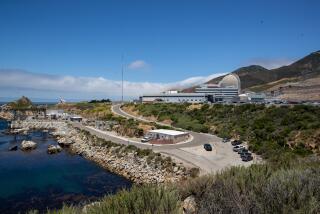Plea by Manure-Powered Plant Rejected : Energy: Panel denies waiver for experimental facility. Edison officials are seeking repayment schedule that will keep company out of bankruptcy.
SAN DIEGO — To the chagrin of cattle owners in Imperial County, a federal energy commission has turned down an appeal from the world’s only plant that makes electricity from manure.
The rejection could spell bankruptcy for the Imperial plant, which burned 1 million tons of manure from 1988 to early 1993 before torrential rains caused it to grind to a sticky halt. The plant had offered a solution to the perennial problem of the cattle industry: what to do with all that dung.
“This is very bad news for us,” said Ross Jenkins, general manager of Phillips Cattle Co. in El Centro and chairman of the feedlot council of the California Cattlemen’s Assn.
The unanimous decision Wednesday by the Federal Energy Regulatory Commission came without discussion at a meeting in Washington. Plant owners are studying whether to appeal to federal court. At issue is whether the Mesquite Lake plant deserves a waiver from a requirement that it use no more than 25% natural gas to operate its generators.
When last year’s rains turned the cattle manure soupy, the facility was forced to switch almost entirely to natural gas to keep operating and sought a waiver.
Southern California Edison, which buys power from the manure plant, opposed the waiver and demanded that its owners repay $6 million to $9 million.
Under an arrangement in which utilities are required to buy power from independent producers who use alternative sources, Edison pays 10 cents per kilowatt for manure power. But it can buy natural gas-generated power for a third of that amount on the open market.
Now that the waiver has been denied, Edison official Tom Gibbs said the company wants to “try to work out a repayment schedule that will keep (the plant) in business.”
The commission agreed that Edison customers should not be stuck with paying extra for electricity produced by natural gas. The amount of any repayment, and the repayment schedule, will be subject to negotiations between Edison and the manure plant owners.
The commission found that the problems caused by last year’s rains were not an anomaly but were symptomatic of technical flaws in the manure plant, flaws that led to a lawsuit between the original investors and the engineers who built the plant.
The California Public Utilities Commission, in urging the federal commission to reject the appeal, had called the manure plant a technological failure.
However, plant engineers hope to have the facility back on-line next month, burning manure once again. Still, they worry that if they are required to make the repayment in a lump sum, it would dry up investment money still needed for the experimental plant.
If the plant folds, the cattle owners are unsure what they will do with the mountains of manure produced by 450,000 cattle that pass through the valley’s feedlots each year.
“The good Lord will just have to find a place to put all this manure,” said Edward (Jiggs) Johnson, one of the owners of El Toro Land & Cattle Co. in Heber.
More to Read
Inside the business of entertainment
The Wide Shot brings you news, analysis and insights on everything from streaming wars to production — and what it all means for the future.
You may occasionally receive promotional content from the Los Angeles Times.









